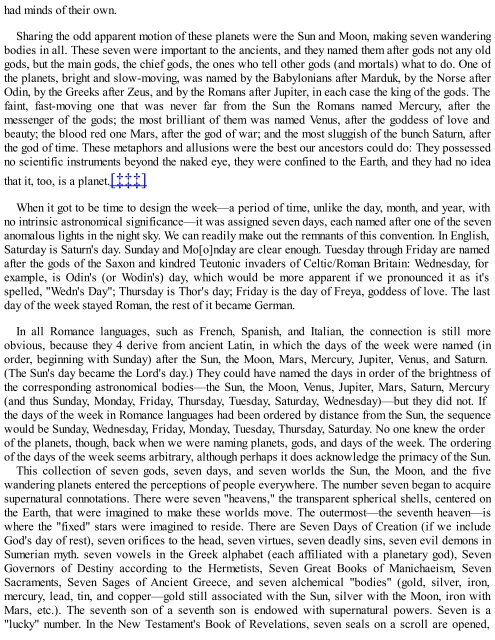Pale Blue Dot ( PDFDrive.com ) (1)
Create successful ePaper yourself
Turn your PDF publications into a flip-book with our unique Google optimized e-Paper software.
had minds of their own.<br />
Sharing the odd apparent motion of these planets were the Sun and Moon, making seven wandering<br />
bodies in all. These seven were important to the ancients, and they named them after gods not any old<br />
gods, but the main gods, the chief gods, the ones who tell other gods (and mortals) what to do. One of<br />
the planets, bright and slow-moving, was named by the Babylonians after Marduk, by the Norse after<br />
Odin, by the Greeks after Zeus, and by the Romans after Jupiter, in each case the king of the gods. The<br />
faint, fast-moving one that was never far from the Sun the Romans named Mercury, after the<br />
messenger of the gods; the most brilliant of them was named Venus, after the goddess of love and<br />
beauty; the blood red one Mars, after the god of war; and the most sluggish of the bunch Saturn, after<br />
the god of time. These metaphors and allusions were the best our ancestors could do: They possessed<br />
no scientific instruments beyond the naked eye, they were confined to the Earth, and they had no idea<br />
that it, too, is a planet.[‡‡‡]<br />
When it got to be time to design the week—a period of time, unlike the day, month, and year, with<br />
no intrinsic astronomical significance—it was assigned seven days, each named after one of the seven<br />
anomalous lights in the night sky. We can readily make out the remnants of this convention. In English,<br />
Saturday is Saturn's day. Sunday and Mo[o]nday are clear enough. Tuesday through Friday are named<br />
after the gods of the Saxon and kindred Teutonic invaders of Celtic/Roman Britain: Wednesday, for<br />
example, is Odin's (or Wodin's) day, which would be more apparent if we pronounced it as it's<br />
spelled, "Wedn's Day"; Thursday is Thor's day; Friday is the day of Freya, goddess of love. The last<br />
day of the week stayed Roman, the rest of it became German.<br />
In all Romance languages, such as French, Spanish, and Italian, the connection is still more<br />
obvious, because they 4 derive from ancient Latin, in which the days of the week were named (in<br />
order, beginning with Sunday) after the Sun, the Moon, Mars, Mercury, Jupiter, Venus, and Saturn.<br />
(The Sun's day became the Lord's day.) They could have named the days in order of the brightness of<br />
the corresponding astronomical bodies—the Sun, the Moon, Venus, Jupiter, Mars, Saturn, Mercury<br />
(and thus Sunday, Monday, Friday, Thursday, Tuesday, Saturday, Wednesday)—but they did not. If<br />
the days of the week in Romance languages had been ordered by distance from the Sun, the sequence<br />
would be Sunday, Wednesday, Friday, Monday, Tuesday, Thursday, Saturday. No one knew the order<br />
of the planets, though, back when we were naming planets, gods, and days of the week. The ordering<br />
of the days of the week seems arbitrary, although perhaps it does acknowledge the primacy of the Sun.<br />
This collection of seven gods, seven days, and seven worlds the Sun, the Moon, and the five<br />
wandering planets entered the perceptions of people everywhere. The number seven began to acquire<br />
supernatural connotations. There were seven "heavens," the transparent spherical shells, centered on<br />
the Earth, that were imagined to make these worlds move. The outermost—the seventh heaven—is<br />
where the "fixed" stars were imagined to reside. There are Seven Days of Creation (if we include<br />
God's day of rest), seven orifices to the head, seven virtues, seven deadly sins, seven evil demons in<br />
Sumerian myth. seven vowels in the Greek alphabet (each affiliated with a planetary god), Seven<br />
Governors of Destiny according to the Hermetists, Seven Great Books of Manichaeism, Seven<br />
Sacraments, Seven Sages of Ancient Greece, and seven alchemical "bodies" (gold, silver, iron,<br />
mercury, lead, tin, and copper—gold still associated with the Sun, silver with the Moon, iron with<br />
Mars, etc.). The seventh son of a seventh son is endowed with supernatural powers. Seven is a<br />
"lucky" number. In the New Testament's Book of Revelations, seven seals on a scroll are opened,


